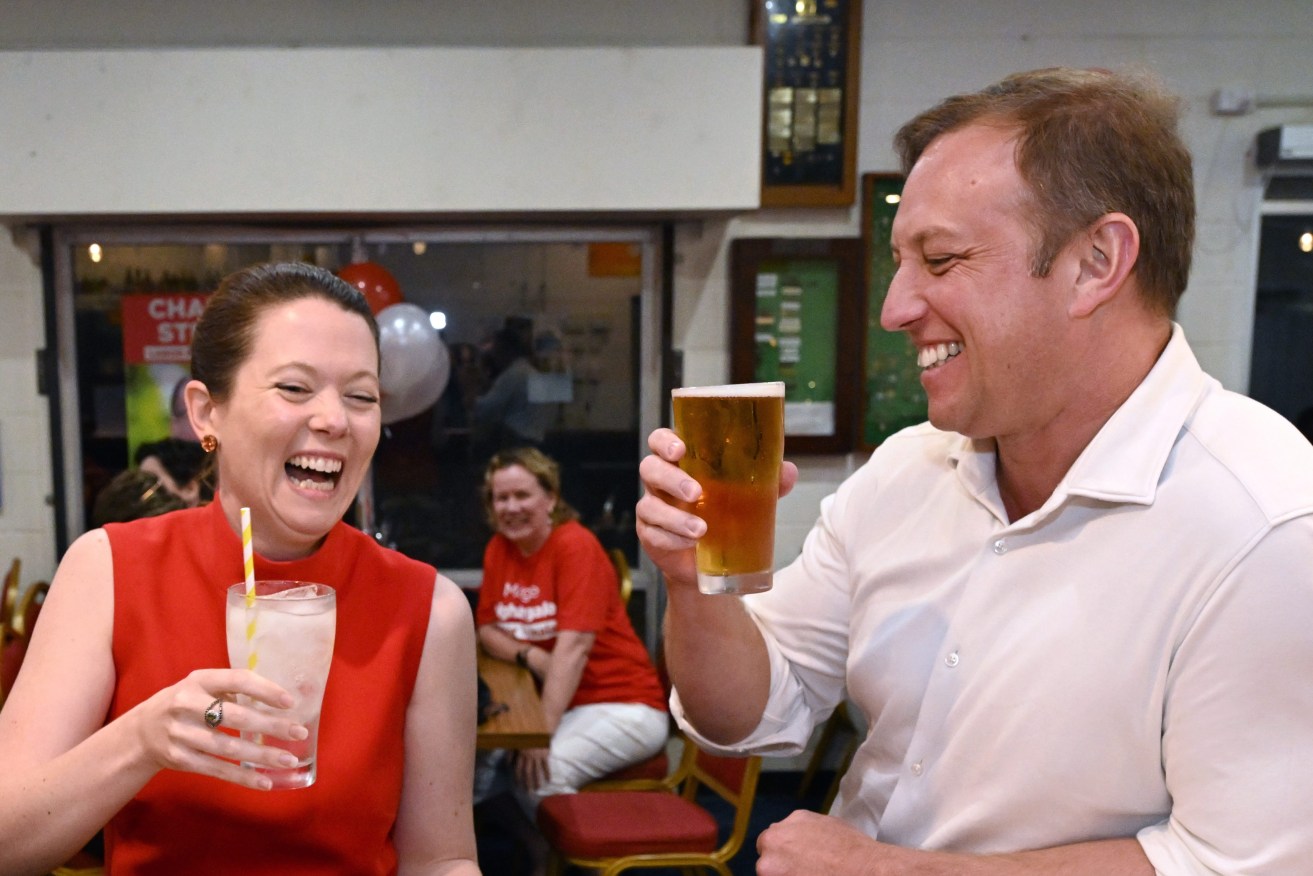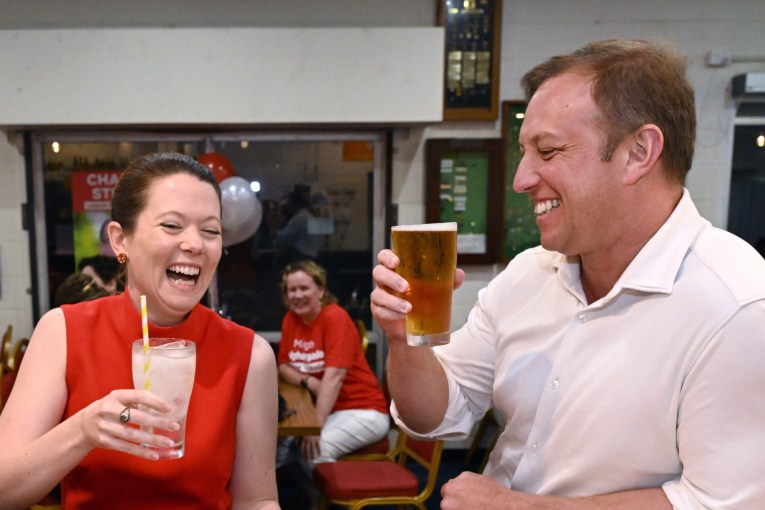If you’re looking for a snapshot of state politics, this bye-bye election is a good place to start
By-elections do not tell the future but they do give us a real picture of how politics looks, right now. Seeing is believing and Dennis Atkins believes Labor is in deep trouble.


Jessica Pugh (left) and Queensland Premier Steven Miles (right) are seen at the Durack Inala Bowling Club where she was celebrating a narrow win in the seat of Inala, held by of retired Queensland Premier Annastacia Palaszczuk. (AAP Image/Darren England)
It was a weekend of true March Madness for democracy in Queensland. Labor was taken to the edge of the abyss in two outer urban western state electorates and given a shocking glimpse just how deep is the hole of anger and despair among frustrated voters.
In Ipswich West it was deep enough to blow Labor out of the water with a swing well north of 17/18 percent while nearby Inala – with enough padding to fill all the lounges at Freedom Furniture – had everyone reaching for a tonic of necessity to fend off a fainting fit as the 15 percent swing hit 20, then 25 before bouncing on 30 points in primary vote terms.
Vertigo was soon the condition of no choice among Labor booth workers, desperate supporters and scrutineers in a seat held by Labor from the time Kev Hooper won it (as Archerfield) in 1972 with some brief interruptions such as One Nation in 1998 and Campbell Newman’s strange lurch to the top in 2012.
Such face slapping by-election swings are not that common in Australian state and federal politics but they almost always tell a story of impending doom.
When the Whitlam Government copped a swing in the mid-teens in 1975 in the northern Tasmanian seat of Bass, it was a taste of what was waiting for federal Labor in December that year – a wipeout.
A similar story unfolded after the Canberra by-election of 1995 when a double digit loss was not just illustrative of the national mood but also predictive of what would happen to the Keating Government a year later.
There are similar examples in state politics – in 1986, Neville Wran’s government lost a heartland electorate of Bass Hill while hanging on in the other safe Labor seat of Rockdale – just over 12 months before the decade of ALP rule came to an end in Macquarie Street.
As a striking parallel with what happened here over the weekend, Wran’s seat was one of those lost in 1986. The new Premier Barrie Unsworth emerged, briefly, as the new member for Rockdale.
So, what is in the detritus left on the beach after the weekend by-elections in this state?
First, a key point has to be made. As suggested above, by-elections are, like opinion polls, not predictive. They can tell you what happened at a point in time and, better than public opinion surveys, they are very large, real-life surveys of some consequence.
So, while not predictive, they are illustrative. They tell us the mood in these electorates in the weeks leading up to Saturday, March 16 in Ipswich West and Inala.
It’s not pretty, in case you need to have it spelled out. People are sullen, grumpy, sour and whatever other word you might find in a thesaurus for being cranky.
The crankiness stems from living with crime, mostly perpetrated by young kids out of the law’s reach. If you are robbed, or even worse, physically attacked, a dysfunctional, under-resourced health system means you’ll have to wait in an ambulance on a hospital ramp to be seen to.
When you get home you return to the struggle to make ends meet in a rented home that is as depressing as the answer to the question, “How much?” at the local servo.
This aside, do the brutal loss in Ipswich West and the near-death experiences in Inala tell us what’s going to happen when the state goes to the polls on W.S. Cox Plate Day, October 26?
Maybe, maybe not.
This is not necessarily the first paragraph of Steven Miles’s political obituary although his colleagues might want to dust off that British classic about Labour losing elections, Things Can Only Get Better, by John O’Farrell, for some gallows humour lines.
Miles and his colleagues know in explicit terms just how tough the task ahead is going to be. They always did and the rationale in replacing Annastacia Palaszczuk with “someone, anyone” was that by late last year the party was on an express train to a 2012-type disaster when former Premier Anna Bligh lost 44 seats, holding just seven after a 16 percent statewide swing.
There was a spark of hope Miles might be able to go a little further than to just save the furniture and turn a massacre into a not-too-bad loss. There is still hope that can happen but there are warning signs and sirens in every corner of the pitch.
As much as the raw results in the two by-elections told a story of deep disgruntlement with Labor – the “it’s time” rust that kills governments as sure as fruit flies destroy crops around the world – there were also flashing amber signs of anti-Labor sentiment everywhere.
Incumbency proved to be a dead weight in the Far North cities like Cairns and Townsville – both previously reliable Labor strongholds – and in Central Queensland areas around Mackay and Bundaberg as well as places out west and to the southern inland districts around Brisbane.
One veteran Labor operator commented as the local government dust settled, state Labor could struggle to hold any seats north of Noosa at the October poll. – which would wipe away just under a third of the ALP’s now 50 seats.
This would leave the likely outcome an LNP majority government winning big in the regions, picking up half a dozen or so seats around Brisbane the South East and getting lucky here or there.
Miles and Labor would need to hold everything in Brisbane and on the Sunshine Coast – the first part of that equation is difficult, the other is impossible.
Yes, Miles might save some furniture but barring some black swan event he might be left picking up the pieces with his bruised Labor friends.
One thing is certain – if the LNP gets the majority that’s on the cards, one of the first priorities will be to expand the local government system of optional preferential voting to state elections.
If there was compulsory preferential voting at the local government elections on Saturday, Labor and the Greens would have prospered, with both winning a number of extra contests.
This is why the LNP detests a this voting system – even though it’s worked well nationally since federation and in just about every state at the same time.
Self-interest: the horse that is always trying hardest.




